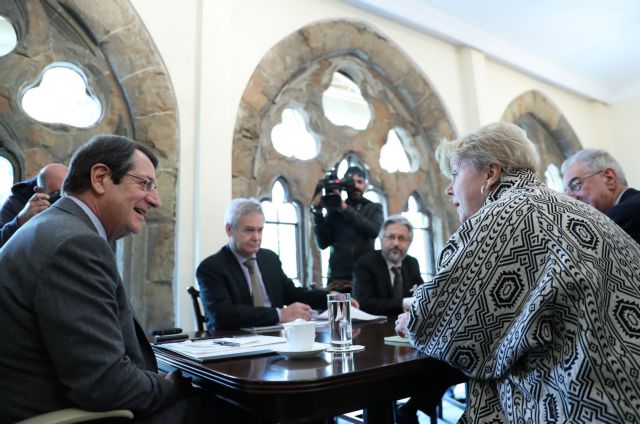Kudret Özersay, the “deputy prime minister and foreign affairs minister” of the regime in Turkish-occupied northern Cyprus, has come out against rushing a new round of settlement talks, for which UN special envoy for Cyprus, Jane Holl Lute has been meticulously preparing, as there is no “common vision” with the Greek Cypriots regarding what a settlement would look like and what the agenda for talks should be.
“I had said that the UN will not pull a rabbit out of a hat, and that is where we are now,” he said.
UN special envoy Jane Holl Lute has asked the two sides to agree by the end of the year on terms of reference on the basis of which the talks – which have been held on and off for over 40 years – might be jump-started.
“She set a time-frame by the end of December for the terms of reference to be agreed to so that she can submit a report to the UN Secretary General, who will decide whether the conditions exist for the resumption of the talks,” Anastasiades said of Lute’s plans.
Ozersay, however, declared that the UN deadline cannot be met due to the lack of convergence on key issues. “We must not put the cart before the horse,” he declared.
Özersay questioned the entire procedure adopted by the UN special envoy. He claimed that each side will interpret the terms of reference as it sees fit, as the differing view of the two sides on what should be negotiated have not been taken into account.
Özersay and the myth of Sisyphus
Noting that there have been major shifts in global politics with leaders pushing their personal agendas, Özersay described the Cyprus problem with the terms of Greek mythology.
For the last 50 years, he said, the Cyprus problem has been like the rock of Sisyphus, which was pushed to the top of the mountain and then rolled down.
Britain immersed in Brexit, EU preoccupied
Özersay also underlined impediments to an international focus on Cyprus problem.
He cited the fact that Britain – which retains its sovereign bases on the island and has to this day played a pivotal role in Cyprus – is preoccupied with the Brexit crisis and that it is unclear what role it will play.
On the broader EU level, he said that the May European Parliament elections – which are exceptionally important for countries like France, Germany, and Greece – will result in member-states tending more to their domestic affairs, just as Turkey in 2019 will be focused on crucial local elections and rapid-fire developments in Syria [where the US has decided to withdraw its forces].
All that, he said, raises serious questions about whether an international conference to solve the Cyprus problem will be feasible in 2019.
Lute lacks vision
Özersay criticised Lute for not referring to a “common vision” and for pushing an agreement on the basis and the agenda for talks by the end of the year.
“For me, there is no such possibility. Still, next year, after the events that I mentioned pass [European Parliament elections and Turkey’s local elections], even if there is a different setting we must not directly discuss the terms of reference, but rather whether we do or do not share a common vision,” he said.




